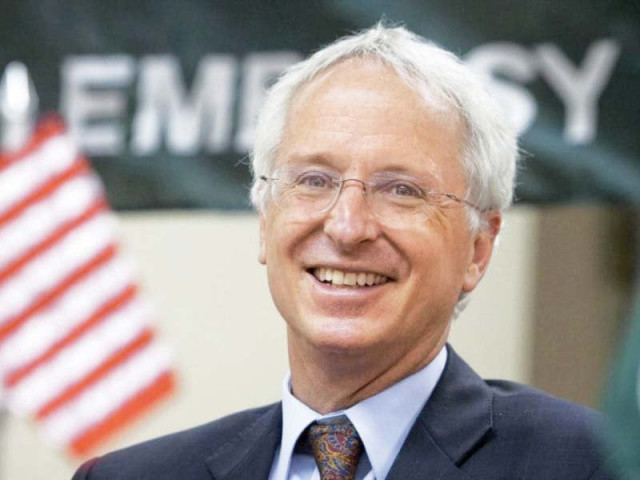Munter ascribes frayed ties to ‘Pakistan fatigue’
Calls for shifting focus from govt-to-govt assistance to partnership between businesses and institution

Cameron Munter. PHOTO: FILE
After a period of great commitment and great effort on the American side to work not only on counterterrorism but also in the development of Pakistan by building social capital and the country’s relations with its neighbours, there is a feeling that many of these things did not work, Cameron Munter told The Express Tribune in an exclusive interview on the sidelines of the annual World Economic Forum.
Munter described this state as ‘Pakistan fatigue’ in the American circles.
Pakistan did not know about OBL's whereabouts: Munter
“Over the last couple of years, there has been [a perception] in Washington what we call ‘Pakistan fatigue’,” he added.
Munter, who served as the US ambassador in Islamabad between 2010 and 2012, is currently President of the East West Institute (EWI) – one of the largest independent think tanks working for conflict resolution.
Negativity aside, Munter was upbeat Pakistan could repair ties with the US by demonstrating successes in the areas that mattered to both countries.
Munter acknowledged his time as ambassador in Pakistan was very difficult. “[There were] many … good things that people wanted to do, but could not,” he said. “Following this period of more modest expectations, what we are hearing today from Raheel Sharif is the possibility that there could be an upsurge in ties.”
Munter spoke to The Express Tribune after attending a talk by former army chief General (retd) Raheel Sharif at the Pakistan Breakfast, organised by the Pathfinder Group.
Raheel narrated successes achieved by the country in the wake of Pakistan Army’s counterterrorism operations and sacrifices rendered by the Pakistani nation. He also spoke about the possibility of forging good relations with all neighbours, including India, “with dignity and honour”. He advised Pakistan to maintain a “fine balance in its relations with all global powers”.
“Perhaps with the new administration in Washington, perhaps with a fresh look, and perhaps with a focus on economics,” both the US and Pakistan can have good relations in future, said Munter.
He said there was a possibility that America could contribute to Pakistan’s success and that they could do so in economics. “I am cautiously optimistic, but it is going to take a change in mood in the US away from Pakistan fatigue,” said Munter.
Echoing Raheel’s remarks, he said the best way for this happen was to have successes on ground. “Perhaps this will demonstrate to the US that there is a common cause and they can do things together, especially in business and commerce,” he added.
US-Pakistan relations: some inconvenient truths
Commenting on the US Office of Inspector-General’s report on the Obama administration’s inability to achieve its goals attached with the Kerry-Lugar aid because of conflicting interests of the USAID and the US State Department, Munter said: “I am a little more sceptical about the possibilities of assistance … I am much more optimistic about the possibilities of private sector development.”
“Whatever the intents and whatever the past, I would look at the future much as General Raheel Sharif does,” he said. “Private sector development does not only mean business, but also university-to-university cooperation and NGO-to-NGO cooperation.”
He said the government-to-government assistance should be put behind and focus should now be on businesses and institutions and “the kind of things the people of Pakistan and the people of American do the best”.
About the possibility of a Free-Trade Agreement, Munter said there was a real perception that the security situation in Pakistan was so difficult that got in the way of many good projects.
He said there were many institutions in the US that were still very apprehensive about going to Pakistan because of Pakistan’s reputation.
With achievements on the terrorism front, a lot of these things can be part of the past. As these trends work in the direction of security, a sense of fairness and openness, countering corruption, speaking honestly about corruption, give a direction to future Pakistan-US businesses and institutions.
Pakistan, he said had “wonderful people and … a great future”.
“I just hope Pakistan and America can get back to the kind of relationship where they should be … Friends as they have been in the past and partners as they should be in the future.”
Published in The Express Tribune, January 24th, 2017.



















COMMENTS
Comments are moderated and generally will be posted if they are on-topic and not abusive.
For more information, please see our Comments FAQ